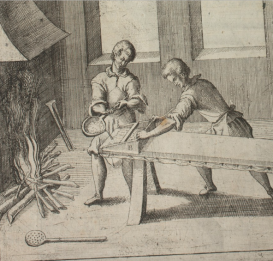This project concerns the role of musical instruments and artisanal knowledge in early acoustics. It is through instruments and objects that sound, otherwise difficult to grasp, becomes visible, tangible, and susceptible to investigation. This became particularly important in the sixteenth and seventeenth centuries, when the practical and experimental dimension of knowledge formation came to the fore. The project addresses concepts of sound propagation in the fields of instrument building and experimental natural philosophy, asking what knowledge on instruments was included by early acoustical scholars, how musical instruments functioned in an experimental context, and what epistemic shifts this brought about.
As a case study, I examine the work of Marin Mersenne (1588–1648), often described as the founder of experimental acoustics. His use of instruments and experiments will be analyzed and contextualized within a broader material culture of technology and musical objects in early modern Europe. The project investigates the epistemological role of instruments in early acoustics in both scholarly and artisanal surroundings. A network of Mersenne’s contacts and experiments will be drawn up to show how knowledge on instruments such as the organ moved between different fields and how this brought about a shift in musical and scientific thinking.

